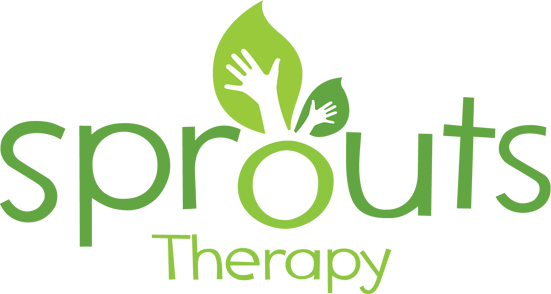Pediatric Speech Therapy

Communication is the foundation of relationships and is essential for learning, play and social interaction.
Communication is fundamental to children’s development; children need to be able to understand and be understood. A Speech Pathologist, also known as an SLP, has advanced training in assessing, diagnosing, and treating disorders related to speech, language, social skills, cognitive-communication, voice, feeding, swallowing, and fluency.
Children who benefit from Speech Therapy
Speech-language pathologists work with children in the following areas:
- Receptive Language: Increase understanding of language (ability to identify objects, follow directions, learn new vocabulary and respond to questions)
- Expressive Language: Improve ability to express wants, needs, and thoughts in multiple modalities (words, sign language, communication device, etc.). Improve a child's ability to name objects, use phrases or sentences, and age-appropriate grammar.
- Speech Sound Production: improve articulation and phonological skills so that a child can be better understood by communicative partners
- Orofacial Myofunctional Disorders: help child establish proper resting posture and function of the orofacial complex to support optimal growth and development, a mature swallow pattern, speech sound production, and airway health.
- Social Communication/Pragmatics: teach children how to interact more appropriately with peers in social settings (such as following rules, taking turns, talking to different communication partners, eye gaze, how close to stand to communication partners, etc)
- Voice/Resonance: help children who may sound hoarse, lose their voices easily, talk too loudly or through their noses
- Fluency: help children to produce smooth speech and reduce stuttering (Repeating sounds, syllables, words or phrases, and/or pausing during speech). Some repetitions are part of typical development up to age five.
- Cognitive Communication: improve a child’s ability to sequence, organize, problem-solve, sustain attention to task, and make decisions.
- Dyslexia/ Literacy Disorders- help a child successfully learn to read by addressing their phonological awareness, reading fluency, decoding skills, phonics, spelling, and reading comprehension.
Speech Therapy at Sprouts Therapy
Speech Therapy at Sprouts is play based and child-led! The SLP creates opportunities for the child to practice the target skill while enjoying motivating toys and activities that are relevant to the child’s interests, which in turn increases attention, builds positive interactions, improves social skills, and promotes a naturalistic setting to encourage skill cross over to home, school and community environments. Examples of play activities done during a speech session may include functional play, construction play, game play with rules, movement play, and/or symbolic play.
Common Conditions We Support
- General Developmental Delays
- Developmental Milestone Delays (Late Talkers)
- Autism Spectrum Disorders
- Receptive and Expressive Language delays
- Articulation and Phonological Disorders
- Childhood apraxia/dyspraxia of speech and other motor speech disorders (e.g. Dysarthria)
- Lack of age appropriate play skills/toy engagement
- Attention and Concentration Deficits (ADD/ ADHD)
- Learning Difficulties
- Literacy Disorders/Dyslexia
- Executive Functioning Deficits
- Social Skill Difficulties
- Neurological Disorders
- Down Syndrome
- Cerebral Palsy
- Cleft Lip and Palate
- Hearing Impairments
- Narrative Language challenges
- Stuttering
- Tongue Thrust
- Traumatic Brain Injury/Childhood Aphasia
- Voice Disorders
- Gestalt Language Processors
- Tongue Tie
- Orofacial Myofunctional Disorders
- Oral Motor Disorders impacting Speech and Swallowing
- Auditory Processing Disorders
Treatments May Include
- Language Development
- Articulation Therapy
- Language Acquisition through Motor Planning (LAMP)
- HANEN- It takes Two to Talk Program
- PROMPT
- Orton Gillingham Approach
- Oral Motor Therapy
- DIR/Floortime Play based Therapy
- Augmentative Communication
- Social Skills Groups
- Activity Schedules
- Cognitive Communication Skills Development
- Gestalt Language Processing Approach to Language
- Neurodivergent Attuned Treatment
- Orofacial Myology
- Hippotherapy/Equine Movement
- Parent Education
Does my child need speech therapy?
As with other skills and milestones, the age at which kids learn language and start talking can vary. Knowing about speech and language development can help parents determine if there's cause for concern.
For more help in determining what communication skills are appropriate for what age, view these speech, language and hearing skills for
ages birth to five years and
school age children.
The Evaluation Process
Initial evaluations are necessary to determine whether your child qualifies for therapy services and to create a specialized therapy program if services are needed.
What to Bring
Please bring prescription glasses, hearing aids, durable medical equipment, or AAC devices your child may use (if applicable).
Assessment Details
Your child’s Speech and Language Evaluation will include a 1 to 1.5 hour evaluation/parent consultation. Evaluations typically consist of standardized testing, clinical observations, and parent-report measures. Because all children are different, your evaluating therapist will determine appropriate testing methods based on your child’s needs. A pediatric speech and language evaluation may include assessment of: oral mechanism examination, speech fluency, voice, speech articulation/intelligibility, expressive and receptive language, social/pragmatic language, language processing/auditory processing.
The Report
A detailed evaluation report and plan of care will be sent to you via our HIPAA compliant software system (Therabill), within your personal client portal approximately four weeks after the assessment. If you have any questions after reviewing the evaluation report, we can set up a complimentary phone consultation with you and the evaluating therapist.
(If your child already has a recent evaluation from another facility, we may be able to use that evaluation to prepare a plan of care and begin treatment.)
The Scheduling Process
If the evaluating therapist has determined your child would benefit from therapy treatment, you may begin scheduling sessions immediately after the evaluation, while waiting for the full report. If there are no ongoing appointments available during your availability window, your child will be added to the waitlist. We may email you one-time openings, as available. These are offered on a first-come, first-serve basis until an ongoing session becomes available for your child.
Speech Therapy is offered through teletherapy, in-clinic or a combination of both.
For clients attending Sprouts at a recommended frequency of one session per week, your child will typically see the same therapist on the same day at the same time. If a child receives multiple weekly treatments, they may be scheduled with a different therapist on different days of the week. Each of your child's therapists are able to view daily notes from previous sessions. When multiple therapists observe your child demonstrating a new skill, it ensures the child is progressing in skill generalization.
New client?
All Rights Reserved | Site by Fix8 Media

